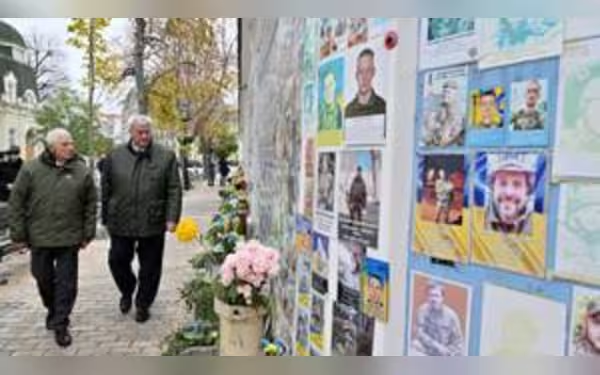Saturday, November 16, 2024 07:36 PM
EU Reaffirms Support for Ukraine Following Trump's Election Victory
- EU vows unwavering support for Ukraine amid Trump victory.
- Borrell emphasizes need for continued military assistance.
- Ukraine resists concessions to Russia, seeking genuine peace.
 Image Credits: nation_pk
Image Credits: nation_pkEU foreign policy chief Borrell visits Kyiv, reaffirming unwavering support for Ukraine after Trump's election victory amid rising tensions.
In a significant development for international relations, EU foreign policy chief Josep Borrell visited Kyiv on Saturday, reaffirming the European Union's commitment to support Ukraine amidst rising concerns following Donald Trump's recent electoral victory in the United States. This visit marks the first by a high-ranking official from Brussels since Trump won the polls, a result that has stirred anxiety in both Ukraine and Europe regarding the future of U.S. support for Ukraine in its ongoing conflict with Russia.
Borrell emphasized that the purpose of his visit was to convey the EU's "unwavering" support for Ukraine, stating, "This support remains unwavering." He highlighted the critical need for continued assistance as Ukraine defends itself against Russian aggression. The EU has collectively invested around $125 billion in support for Ukraine since Russia's invasion in 2022, while the United States has contributed over $90 billion, making it Ukraine's largest donor.
Trump's campaign rhetoric raised doubts about the future of U.S. military and financial aid to Ukraine, with suggestions that he might seek a quick resolution to the conflict. Borrell acknowledged the uncertainty surrounding the new administration's approach, noting that President Joe Biden still has two months left in office to make impactful decisions. He stressed the necessity for increased military support, training, and expedited supplies to bolster Ukraine's defense efforts.
As the conflict drags on, Ukraine's troops are facing mounting challenges on the battlefield, struggling to repel Russian advances. The political landscape in Europe is also shifting, with countries like Hungary opposing military support for Ukraine, which could complicate consensus within the EU for further action.
Ukrainian Foreign Minister Andriy Sybiga reiterated the country's stance against making concessions to Russia, stating, "Everyone needs to realize that appeasement of the aggressor will not work." He called for genuine peace rather than temporary solutions that could lead to further conflict. Sybiga also expressed hope that changes in U.S. leadership could present new opportunities for peace, indicating that discussions have already begun with Trump's team following a congratulatory call from Ukrainian President Volodymyr Zelensky.
The situation remains fluid as Ukraine navigates the complexities of international support and internal challenges. The EU's commitment to Ukraine is clear, but the potential shifts in U.S. policy under Trump could significantly impact the ongoing conflict. As the world watches closely, the hope for a peaceful resolution continues to be a priority for Ukraine and its allies.













